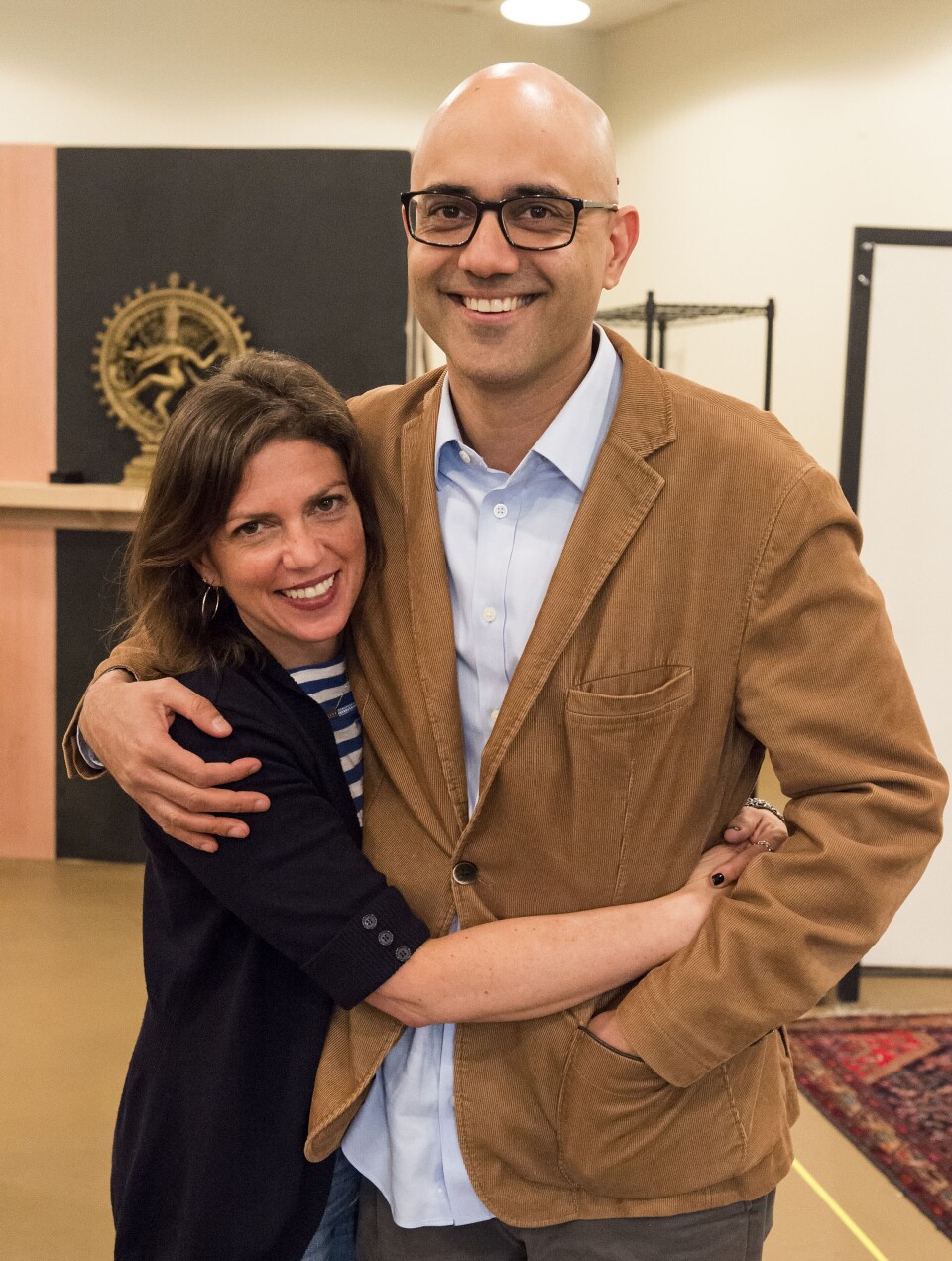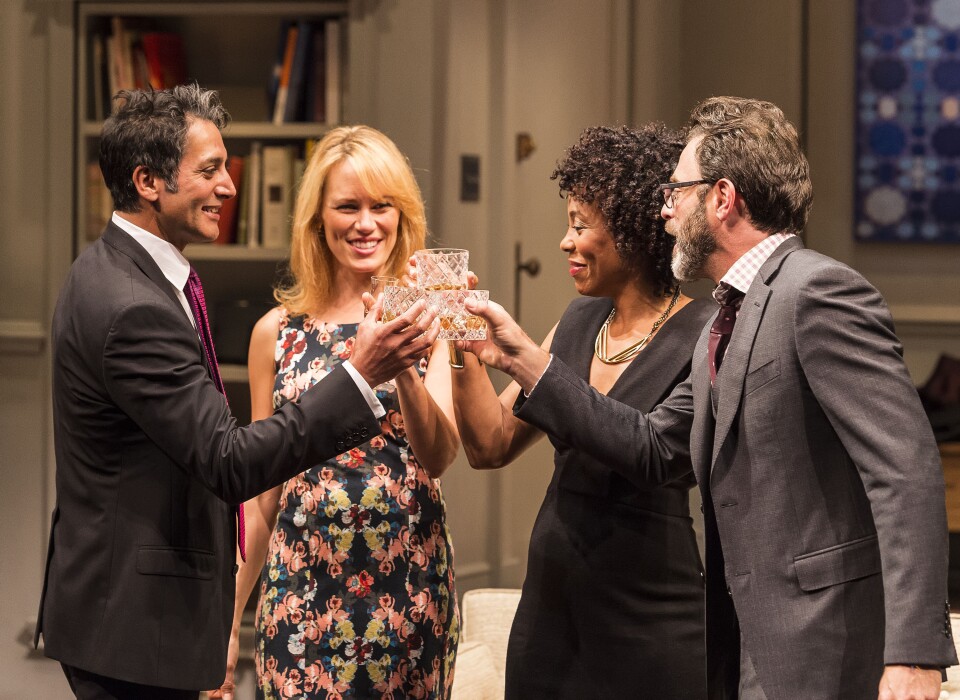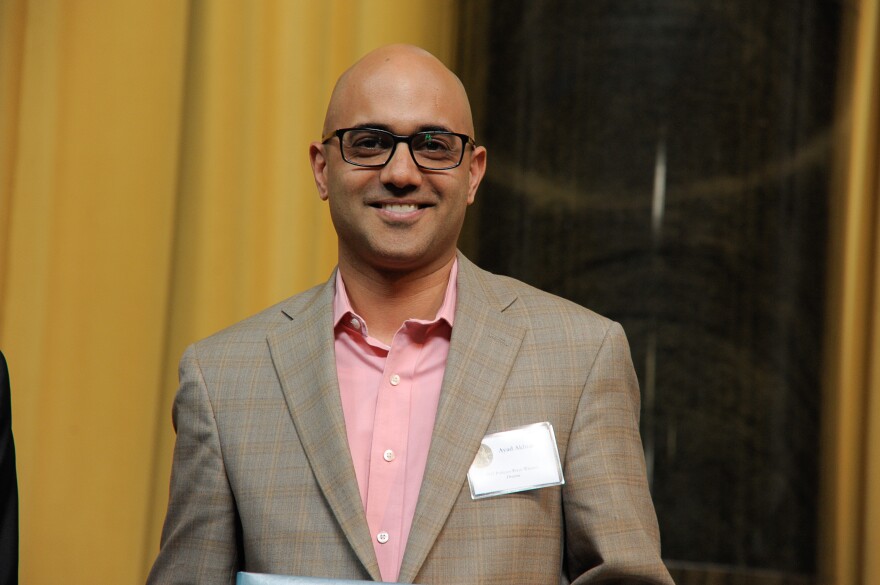Ayad Akhtar discusses his Pulitzer Prize-winning play, "Disgraced," and how he explores issues of Muslim identity in post-9/11 America; Reggae icon Burning Spear and his wife and manager Sonia Rodney prepare for his final appearance in California.
Playwright Ayad Akhtar's 'Disgraced' and 'the nuances of Muslim identity in post-9/11 America'
Three years ago, playwright Ayad Akhtar won the Pulitzer Prize for Drama for his play titled “Disgraced.” On the surface, "Disgraced" seems simple: five characters, one set, one act. But in a swift 90 minutes that deftly balances humor and drama, Akhtar digs deep into notions of faith and identity.
The lead character, Amir, is a successful attorney who has misled the Jewish partners at his law firm into believing that he is a Hindu from India. He’s hiding that he is really of Pakistani descent and was raised in a Muslim household. But he is no longer a believer, and he insists that the Koran is outdated and misleading.
A dinner party discussion with his white wife, who’s an artist, a Jewish curator and his black wife who is also an attorney, devolves into a series of confrontations. You can’t help but think of the tensions faced by Muslims in the U.S., whether native-born or emigrés.

When The Frame's senior producer Oscar Garza spoke with Ayad Akhtar, he talked about how diversity and immigration have forever changed the notion of what Americans look and sound like.
Interview Highlights
Tell us about your origins and growing up in the middle of America.
Growing up in Wisconsin in a Muslim family of Pakistani origins — as long as we were Green Bay Packers fans, everyone was cool.
That's the ultimate litmus test.
It certainly is in that part of the country. And, if anything, ethnicity and identity from that perspective, there was an invisibility. Nobody knew what it meant that we were from where we were from. We might as well have been from Jamaica or Antarctica. Nobody really knew where any of those places were, anyway. But 9/11 really marked a shift where that invisibility turned into a visibility, there was a very clear sense that we did exist and we existed because of peoples' fears. So it was obviously an interesting shift within the community that is ongoing still and which I have been writing about for a while. "Disgraced" was the second work in the vein of writing about this experience.
Before we dig more into the play itself, I wanted to ask more about your background. You were born in New York?
I was born in Staten Island.
How did your family end up in Wisconsin?
JFK's science and technology push meant that the State Department was trolling the world for scientific talent. After 1965 there was a program that would give promising young doctors or engineers or scientists visas, plane tickets, apartments and jobs. My folks came over on that program in the late '60s and ended up in Staten Island. My dad was working at U.S. Public Health in the cardiology department where I was born. We were shortly moved by my father to Wisconsin where he started up the cardiology lab at the University of Wisconsin. My mom never forgave him for taking us from New York into the hinterlands.
They were both born in Pakistan?
They were.
There was an interview in the Washington Post where you said that "Tragedies become disconnected from the mass roots that are at its origins." Do you think that's still true now, three years after making that statement?
I'm speaking of the tragic form within dramatic [convention]. When we think of tragedy we think of something in the American bane, more like Eugene O'Neill or Arthur Miller, which is not a particularly raucous form. You're not talking about huge involvement from the audience. Aristotle's paradigmatic example of tragedy, which he calls the expunging of emotion through pity and terror — terror being the key emotion — is that when the furies arrived on stage in one of the tragic cycles during the festival, pregnant women in the audience were so terrified that they miscarried in the aisles. Of course, it could only be an apocryphal anecdote, but it speaks to the level of emotion and engagement that is much closer to what we experience in horror films now. So the notion of tragedy as this high-minded, noble thing — sure there's that, but there was also a visceral, physical involvement of the audience that speaks to the mass appeal of that form. "Disgraced" has that kind of audience participation in a story that ultimately ends in a symbolic death, if you will.
How did you set out to address that notion of tragedy in this play, which is set at a dinner party? It's not a parlor drama, but ...
It's a boulevard comedy that runs aground. (laughs)
So did you have a clear idea for how you wanted to get at the tragedy in that setting?
I didn't. You know, I've been writing a long time. For a long time I was using writing to paint a portrait of myself, to myself, of the kind of person I wished to be seen as by others — a writer who was worthy of admiration who was singular and unique and who was announcing his remarkable uniqueness to the world. As I got older and continued to fail at doing that — because I was really not that talented at that particular thing — I started to feel that art and writing was something more about engaging with the world around me and less about me expressing myself. As that shift happened, I came to understand audiences on a much different level. I feel connected. People often say, Who's your audience? I say, Well, my audience is the audience. I feel very connected to the audience and to that simple sense of being told a story that all children have, and that children turn off when they feel like the story isn't being told anymore. That sense of simple narrative listening to me is where the audience lives and breathes. I feel unusually connected to that now later in my aspirations toward becoming the writer I want to be. That's where I'm writing from — that sense of tragedy and that sense of engagement which is about connecting to the audience.

The protagonist in this show is a hard working successful lawyer. He's a Pakistani-American, but he's passing as an Indian because of his antipathy toward Islam. He's both acculturated and assimilated. And I wanted to pick up on something that has recently been in the news where Donald Trump said that Muslims don't assimilate. My question at the end of the play was: Are Muslims allowed to assimilate in this country?
Well, that's the question of the play. You have a guy who, for all intents and purposes, is living The American Dream and has so clearly taken on [the attitude of]: Whatever you think about Muslims, trust me I know even worse. I hate them even more than you do because I actually know them. I'm going to tell you what's wrong with them. I'm going to tell you what's wrong with all of them. That guy who is demonstrating his militantly secular bonafides, even he is not allowed to leave that behind. That speaks to the nature of the polarized climate that we're in, where people are responding to one another, Muslim or not. This is not even a Muslim issue. It's an issue of the lowest common denominator of identity marking. If you're white you must feel this. If you're Latino you must feel that.
I wanted to follow up with something you said in the Los Angeles Times, which is that after a terrorist attack, members of your family won't leave your house for days for fear of terrorist reprisals. At some level I was surprised and at some level not. Still, I was a little shocked.
Well, look — it's what's happening. There's just an animus in this country, spoken or unspoken, toward those who are identifiably of Muslim origin or even non-identifiably of Muslim origin. You're doing math on a plane, What are all those funky numbers? So that's the climate that we're living in. But again, I want to reiterate that it's not just like that for [Muslims]. Yes, it's bad for Muslims, but this speaks to a larger climate problem that's afoot.
You have also pointedly said that the protagonist of this show is not a mouthpiece for your views.
No. And how could he be? Every time I write something, people think that's me. But there's a lot of contradicting points of view in all of the work. These are very skillfully, I hope, concocted dialectics — dramatic and intellectual. They don't work without opposition. I'm not identified with any one of those oppositions, per se. I don't even have necessarily a politics. I think at the end of the day, having a political opinion about things mitigates my ability to identify with my characters, and that's my job.
Do you ever forget what you look like?
I can't anymore. If I did, then that was another time in my life. I'm glad I don't forget what I look like. I like who I am.
But that doesn't necessarily mean that you don't like who you are.
It used to mean, when I forgot who I looked like, that was an indication of not liking how I looked. I did want to look different. I grew up in Wisconsin and all the girls that I liked, they liked guys that didn't look like me. I wish I looked like those guys. So I have come of age in a different way where I have come to understand much more deeply what it is that I am, what I'm made of, what I come from, what that signifies, and what that means about me to myself. And I'm much more at peace with it. It also allows me to write more freely about it.
Your play is said to be, currently, the most produced play in this country. There are obvious reasons why this is the case — it's topical and timely. But is there anything about it that's surprised you? What do you notice about different productions and audience reactions around the country?
I am surprised. I think it does make sense because it's a single set with five characters and allows theaters to tick off some diversity boxes and alleged community engagement. I think they find the community is a little bit less clear about how they feel about the play once it's been done. Audiences react in very weird intense ways often. Sometimes counterintuitive. Sometimes people feel like they've been sold this thing that they're going to go see a play about those other people — those Muslim people or whatever. Then they go see the play and I think they don't have that experience. They had an experience that somehow touched or spoke to them about their own experience. I had a guy come up to me in Atlanta. I was doing an event around the play and he came up to me after and said, I saw your show on Broadway — this 60-year-old white guy — and I want to tell you that I walked away, not thinking about Islam or anything. I was in the military my whole life and I had Latino and black officers above me, and Latino and black soldiers below me. And I saw men my whole life struggling in their careers because they couldn't figure out where their loyalties lay. That was the guy that I saw in your play.
So people find their own touchstones and their own ways of responding to the work. There's a lot of folks who feel that the play is dangerous because of Amir's discourse; his deconstructing of the Islamic mythos in his drunken rant is putting something out there that is not productive.
You've heard that from Muslims?
Muslims and non-Muslims. I've heard that from all sorts of people. Then I hear a lot from Muslims who pull me aside and [whisper], We know what you're doing. But they are not going to understand, so don't do it in front of them.
And how do you respond?
The process of becoming American is learning how to make fun of yourself and becoming self-critical. That's the whole point. The whole point is to say, This is where I come from, this is what I like and what I don't, this is what I think it is. Let's laugh at this. Let's look at it together and become part of the larger tapestry. Let's allow ourself the vulnerability to become part of the larger tapestry. The problem is that in today's climate, Muslims can't be vulnerable. I was talking about the nuances of Muslim identity in post-9/11 America — this mindless card carrying, jingoistic American patriotism as a Muslim to be able to demonstrate your loyalty to this country, which is stupid. That jingoistic patriotism is stupid in the first place. But we as Muslims have to say, We have absolutely no qualms in order to prove that we're American. But that doesn't speak to the reality of anything! So admittedly, it's a bizarre environment to be criticizing Muslims in public.
Jamaican reggae legend Burning Spear to play his final California concert
Born Winston Rodney in 1945, Burning Spear hails from Saint Ann’s Bay in Jamaica, the same town as another legendary reggae artist, Bob Marley. It was an early meeting with Marley that led Spear to pursue a recording career.
The 71-year-old artist has been touring for well over four decades. Now based in Queens, New York, he runs his own record label with his wife and manager, Sonia Rodney. Burning Spear is coming to Los Angeles on June 26 as part of Reggae Night at the Hollywood Bowl.
But, as the singer tells The Frame host John Horn, if you want to catch him on stage here in California, this will be your last chance.
Interview Highlights
Tell us what's special about your upcoming Hollywood Bowl show.
Spear: It's going to be my last show in California. Over the past years touring, I have been going back and forth to California and the time is right for "I Man" to stand down from the stage. I said it makes sense to do this last show and say bye to my fans.
https://www.youtube.com/watch?v=ePOlKRLij34
Sonia, I want to hear about working with Burning Spear. Do you call him a reggae legend in the house or do you call him something else?
Rodney: I call him "Spear." (laughs). Or "pooh bear."
How did you decide that you wanted to be business partners and how does that differ from your marriage? Can you describe how you wanted to work together?
Rodney: After years of Spear touring and doing everything, he wasn't making any money. He looked at me one day — I used to work in [retail] — and said, "You probably need to take over my business." I was like, "Take over your business?" He said, "Yeah, you could take over my business and we could work together as a team." So I quit my job and I went out and bought a little typewriter and I put it in the dining room and I started to learn how to type. That's how it got started.
Spear: Since she became a part of the business and became a partner, there's been a lot of improvements business-wise. I was always touring for agents and promoters and I wasn't making any [money]. After I had her step in, we started to make something. It became so progressive that the business grew and grew to a distance where a lot of people didn't expect we were doing such good work together. Since that time, Spear's been burning, burning, burning.
Reggae music over the last several decades has changed dramatically, the audience has grown. What are you most satisfied about in terms of the way that the music is received? And what are your concerns about the way in which musicians work and can make a living these days?
Spear: For a musician to make a living right now, it's very hard to be honest. The music business and industry — it's not like before. It's harder for a musician to really go there and play instruments and live off of it. The record company is not doing what they are supposed to be doing as before. What they're always saying to the artist [is], You've got to be touring to make a living from your music. I don't believe in artists always having to tour to make a living. This music generates a large portion of money and this money just stays among record companies, labels and distribution.
If I were to ask you which song is the most meaningful personally to each of you from Burning Spear's entire collection, what would it be?
Spear: To me, I would say "Slavery Days."
Rodney: And that's my song also — "Slavery Days."
https://www.youtube.com/watch?v=29LzyyqHA48
Why do you pick that song?
Spear: Because of the struggle of myself and many other musicians or artists based on how we've been treated in this reggae music business by record companies, labels and distribution. We've been pushed around, people always disrespecting us. I think the days of slavery — I've been treated in that way and in that manner as a Jamaican artist and a reggae artist.
Sonia, why is that song so important to you?
Rodney: Because slavery affects every race, color, creed in every different way. To me, slavery was never about color. I think slavery was about money. Every generation in creation experiences some form of slavery because slavery is universal.




